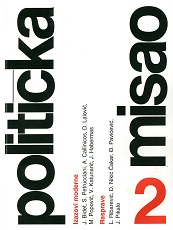Nova i stara politička znanost
POLITICAL SCIENCE OLD AND NEW
Author(s): Leo StraussSubject(s): Politics / Political Sciences
Published by: Fakultet političkih znanosti u Zagrebu
Keywords: politics; science; new political science; Aristotelian political science
Summary/Abstract: Has the new political science, which operates in the conditions of democracy, brought to light anything of political importance that the old political science at its best did not know at least as well? The new political science starts from the modern understanding of science, which holds that only scientific knowledge is genuine knowledge. Just as classical physics had to be superseded by nuclear physics so that the atomic age could come in via the atomic bomb, the old political science had to be superseded by a sort of nuclear political science. Serious criticism of the old political science is a waste of time; we know in advance that it could only have been a pseudo science, although perhaps including a few remarkably shrewd hunches. This is not to deny that the adherents of the new political science sometimes engage in criticism of the old, but they demonstrate a constitutional inability to understand the criticized doctrines on their own terms. The new political science deems that our political situation is entirely unprecedented, and that an unprecedented political science is called for. But it fails to see that an unprecedented political situation would be a situation of no political interest, i.e. not a political situation. Now, if the essential character of all political situations was grasped by the old political science, there seems to be no reason why it must be superseded by a new political science. While the old, Aristotelian political science was based on political experience, the new is based on scientific psychology. The Aristotelian political science views political things in the perspective of the citizen; since there is of necessity a variety of citizen perspectives, the political scientist or political philosopher must become an umpire. The new political science on the other hand looks at political things from without, in the perspective of the neutral observer. Based as it is on empirism, it must reject the results of political understanding and political experience as such, and since the political things are given to us in political understanding and political experience, the new political science cannot be helpful for the deeper understanding thereof. The break with political understanding of political things necessitates the making of a language different from the language used by political men. The new political science claims that only its own language is unambiguous and precise. Yet this claim is not warranted. The language of the new political science is not less vague, but more vague, than the language used in political life. In the crisis of the modern world, while Rome burns, one may say of it that it fiddles, but, unlike Nero, it does not know that it fiddles, and it does not know that Rome burns.
Journal: Politička Misao
- Issue Year: XLIX/2012
- Issue No: 02
- Page Range: 207-228
- Page Count: 22
- Language: Croatian

